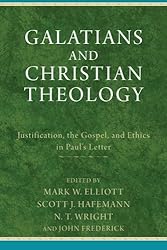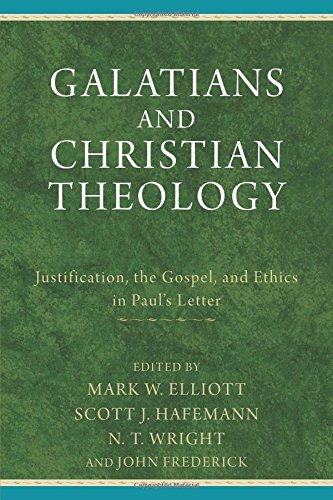 The content of Galatians and Christian Theology: Justification, the Gospel, and Ethics in Paul’s Letter, ed. by Mark Elliot, Scott Hafemann, and N. T. Wright, originates in the triennial Scripture and Theology conference hosted at the University of St. Andrews. To those interested in the study of Galatians, this collection of essays will be a most welcomed addition to the many scholarly discussions and debates.
The content of Galatians and Christian Theology: Justification, the Gospel, and Ethics in Paul’s Letter, ed. by Mark Elliot, Scott Hafemann, and N. T. Wright, originates in the triennial Scripture and Theology conference hosted at the University of St. Andrews. To those interested in the study of Galatians, this collection of essays will be a most welcomed addition to the many scholarly discussions and debates.
The volume is structured into three parts: justification, the gospel and ethics. Each section includes a number of essays from a wide range of scholars of different disciplines and academic interests. While an extended review of every essay is certainly unnecessary in this forum, a brief comment on two essays is warranted.
First, Richard Hays’ essay titled ‘Apocalyptic Poiesis in Galatians’ defines an apocalyptic reading of Paul with three characteristics: divine initiative, the scheme of ‘two ages’, and a sharp break with Judaism/‘salvation history’/Israel (203). While agreeing with the first two characteristics, Hays challenges the third element in the apocalyptic interpretation. Instead of breaking from Israel’s story, Hays suggests that Paul develops a retrospective hermeneutical transformation of Israel’s story in light of God’s redemptive action. In other words, from the vantage point of the ‘new age’, one may now have an appropriate retrospective reading of Israel’s Scripture that illuminates God’s previously scripted story; a story which ‘prefigures God’s action in Christ’ (208). After outlining three motifs that substantiate this retrospective reading (paternity and sonship, the passion of Jesus as a saving event, and our participation in Christ), Hays applies the theological consequences and implications of these motifs for a reading of Galatians. In sum, the Father acts graciously to rescue his people and create a new covenant community, the cross is the decisive event that is the pivot of the new age, and human beings receive the benefits of God’s action by being incorporated in Christ (216-217).
Second, Matthew V. Novenson’s essay centers on the appropriate meaning of Paul’s use of Ιουδαϊσμος in Galatians 1:13-14. Seizing upon the work of Steve Mason (who himself proposed a revision of the term) Novenson concludes that the verbal form ιουδαϊζω, means to ‘act like a Jew’, which was only something that non-Jews could do (Mason’s point). So in Galatians 2:14, Paul rebukes Peter for insisting that the Gentile Christians judaize (ιουδαϊζειν). Peter is not himself judaizing, he is forcing the Gentiles to judaize. Following the conventional rules of etymology, the nominal form (Ιουδαϊσμος) should refer to “the adoption of Jewish customs by non-Jewish people” (29) or put simply ‘the act of behaving like a Jew’ (32). But Novenson, while agreeing with Mason concerning the verb ιουδαϊζειν, contends that the noun ιουδαϊσμος is actually something that Jews would do. This certainly accounts for Paul’s use of the noun in Gal.1:13, where Gentiles are not in the context. Paul’s usage also agrees with the use of ιουδαϊσμος in 2 Maccabees, where the term refers to ‘the cause championed by Judah Maccabee’ (32). For Novenson then, the verb ιουδαϊζειν refers to non-Jews who adopt Jewish rituals, whereas the noun ιουδαϊσμος refers to Jews who promote the adoption of Jewish customs and rituals. The important point to note is that not all Jews practice ιουδαϊσμος, as this term refers to a certain cause or political movement that arose in the Maccabean era. A better gloss for ιουδαϊσμος is not ‘Judaism’ but ‘the judaization movement’ (36). Novenson’s observations, along with the many other studies on this issue, will challenge any overly simplistic and monolithic reading of ‘Judaism’ as we understand the term.
Two concluding observations are worth pointing out. First, this volume is not entrenched in the debates surrounding the New Perspective on Paul. In fact, this volume is more concerned with the issues surrounding the Apocalyptic school within Pauline scholarship. One may notice the oft cited work of J. Louis Martyn, in addition to the many chapters that directly address apocalyptic issues (‘Apocalyptic Poiesis in Galatians – Richard Hays; “Now and Above; Then and Now (Gal. 4:21-31): Platonizing and Apocalyptic Polarities in Paul’s Eschatology – Michael B. Cover; Can We Still Speak of ‘Justification by Faith?’ An In-House Debate with Apocalyptic Readings of Paul – Bruce McCormack). In light of this, it is regrettable that J. Christiaan Beker does not receive more attention in the volume, however this is likely due to Beker’s non-apocalytpic understanding of Galatians in Paul’s overall apocalyptic theology. Nevertheless, these discussion serve as a refreshing approach to the study of Galatians.
Second, this volume seeks to address the theology of Galatians from a number of different disciplines. There are essays that address issues strictly in the field of biblical studies (notable, Paul’s Former Occupation in Ioudaismos – Matthew V. Novenson; Arguing with Scripture in Galatia: Galatians 3:10-14 as a Series of Ad Hoc Arguments – Timothy G. Gombis), while other essays display a mixture between biblical studies and historical theology (cf. Yaein: Yes and No to Luther’s Reading of Galatians 3:6-14 – Scott Hafemann; “Nor an Idle Quality or an Empty Husk in the Heart”: A Critique of Tuomo Mannermaa on Luther and Galatians – Javier A. Garcia). Additionally, it is equally refreshing to see some essays within the field of systematic theology. For instance, Darren Sumner’s essay on Karl Barth’s view of eternity as it relates to ‘time’ in Galatians, and Scott Swain’s consideration of the Trinitarian implications of Galatians 4:4-7 (one may also note Edwin Chr. van Driel’s ‘third way’ supralapsarian proposal for Paul’s narrative concerning Christ). In sum, the multiplicity of perspectives found in this volume will enhance a balanced reading and interpretation of this all important epistle and anyone who is remotely interested in Galatians will thoroughly enjoy this volume.


One comment